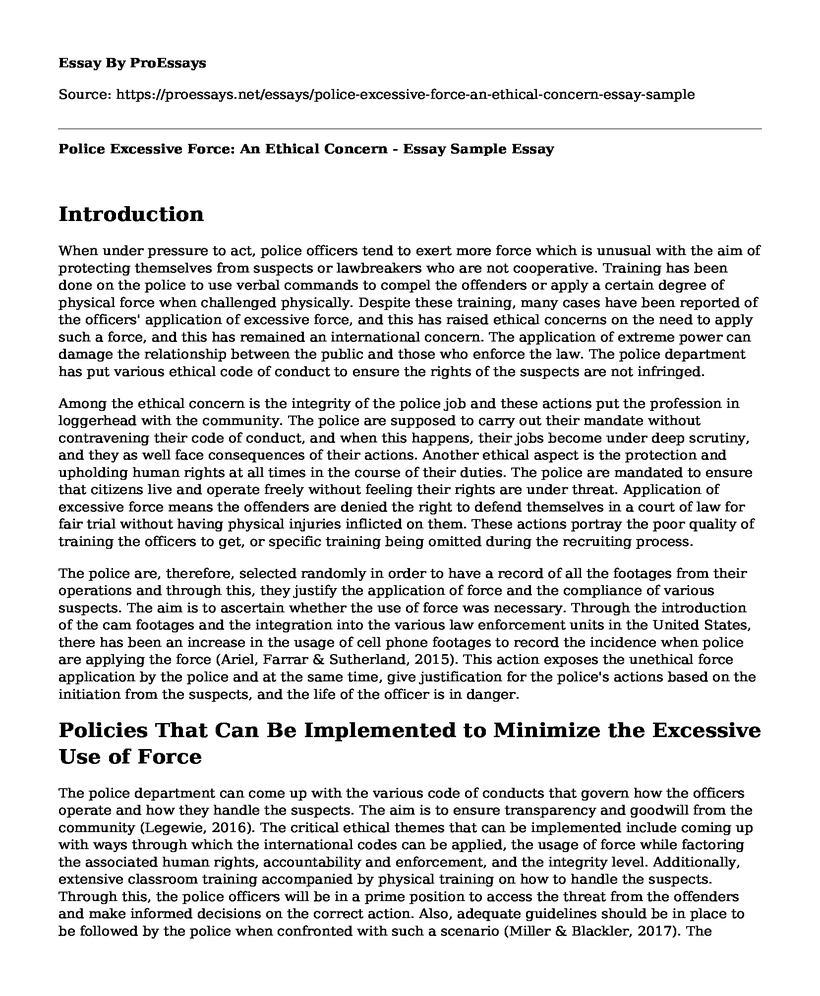Introduction
When under pressure to act, police officers tend to exert more force which is unusual with the aim of protecting themselves from suspects or lawbreakers who are not cooperative. Training has been done on the police to use verbal commands to compel the offenders or apply a certain degree of physical force when challenged physically. Despite these training, many cases have been reported of the officers' application of excessive force, and this has raised ethical concerns on the need to apply such a force, and this has remained an international concern. The application of extreme power can damage the relationship between the public and those who enforce the law. The police department has put various ethical code of conduct to ensure the rights of the suspects are not infringed.
Among the ethical concern is the integrity of the police job and these actions put the profession in loggerhead with the community. The police are supposed to carry out their mandate without contravening their code of conduct, and when this happens, their jobs become under deep scrutiny, and they as well face consequences of their actions. Another ethical aspect is the protection and upholding human rights at all times in the course of their duties. The police are mandated to ensure that citizens live and operate freely without feeling their rights are under threat. Application of excessive force means the offenders are denied the right to defend themselves in a court of law for fair trial without having physical injuries inflicted on them. These actions portray the poor quality of training the officers to get, or specific training being omitted during the recruiting process.
The police are, therefore, selected randomly in order to have a record of all the footages from their operations and through this, they justify the application of force and the compliance of various suspects. The aim is to ascertain whether the use of force was necessary. Through the introduction of the cam footages and the integration into the various law enforcement units in the United States, there has been an increase in the usage of cell phone footages to record the incidence when police are applying the force (Ariel, Farrar & Sutherland, 2015). This action exposes the unethical force application by the police and at the same time, give justification for the police's actions based on the initiation from the suspects, and the life of the officer is in danger.
Policies That Can Be Implemented to Minimize the Excessive Use of Force
The police department can come up with the various code of conducts that govern how the officers operate and how they handle the suspects. The aim is to ensure transparency and goodwill from the community (Legewie, 2016). The critical ethical themes that can be implemented include coming up with ways through which the international codes can be applied, the usage of force while factoring the associated human rights, accountability and enforcement, and the integrity level. Additionally, extensive classroom training accompanied by physical training on how to handle the suspects. Through this, the police officers will be in a prime position to access the threat from the offenders and make informed decisions on the correct action. Also, adequate guidelines should be in place to be followed by the police when confronted with such a scenario (Miller & Blackler, 2017). The recruiting steps should also be made thorough and qualified personnel deployed to handle the process to ensure the candidates meet all the requirements for the selection, including how they handle their emotions.
Conclusion
In conclusion, necessary corrections should be made to ensure the policy only applies justified force and when their life is under threat in order to subdue the offenders. Having ethical codes of conducts will be key in ensuring the complaints reduce regarding the force applied by the police.
Reference
Ariel, B., Farrar, W. A., & Sutherland, A. (2015). The effect of police body-worn cameras on use of force and citizens' complaints against the police: A randomized controlled trial. Journal of quantitative criminology, 31(3), 509-535. Retrieved from https://link.springer.com/article/10.1007/s10940-014-9236-3
Legewie, J. (2016). Racial profiling and use of force in police stop: How local events trigger periods of increased discrimination. American Journal of Sociology, 122(2), 379-424. Retrieved from https://www.journals.uchicago.edu/doi/abs/10.1086/687518
Miller, S., & Blackler, J. (2017). Ethical issues in policing. Routledge. Retrieved from https://www.taylorfrancis.com/books/9781315256108
Cite this page
Police Excessive Force: An Ethical Concern - Essay Sample. (2023, Apr 10). Retrieved from https://proessays.net/essays/police-excessive-force-an-ethical-concern-essay-sample
If you are the original author of this essay and no longer wish to have it published on the ProEssays website, please click below to request its removal:
- Discrimination Against People With Mental Health Problems
- Cause and Effect Essay on Virtue in the Vindication of the Rights of Women
- Rhetorical Strategies in "The False Comfort of Securing Schools" Essay
- Essay Sample on Addiction Models: Sociological Construct Most Appropriate
- Torture: Physical & Mental Suffering for Information or Punishment - Essay Sample
- Adolescence & TDV: Monitoring Children in a Vulnerable Period - Essay Sample
- Essay Example on Adopting National Identity Cards: Pros & Cons







